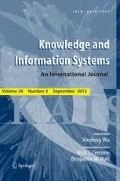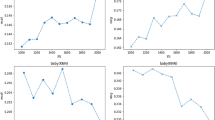Abstract
The success of recommender systems has made them the focus of a massive research effort in both industry and academia. Recent work has generalized recommendations to suggest packages of items to single users, or single items to groups of users. However, to the best of our knowledge, the interesting problem of recommending a package to a group of users (P2G) has not been studied to date. This is a problem with several practical applications, such as recommending vacation packages to tourist groups, entertainment packages to groups of friends or sets of courses to groups of students. In this paper, we formulate the P2G problem, and we propose probabilistic models that capture the preference of a group toward a package, incorporating factors such as user impact and package viability. We also investigate the issue of recommendation fairness. This is a novel consideration that arises in our setting, where we require that no user is consistently slighted by the item selection in the package. In addition, we study a special case of the P2G problem, where the recommended items are places and the recommendation should consider the current locations of the users in the group. We present aggregation algorithms for finding the best packages and compare our suggested models with baseline approaches stemming from previous work. The results show that our models find packages of high quality which consider all special requirements of P2G recommendation.
















Similar content being viewed by others
Notes
In general, for a set of n items, the viability can be defined by aggregating their pairwise relevance or by defining an n-ary function. In this paper, for simplicity and due to the application domain of our case studies in the experiments, we follow the first approach.
Since the user has visited all these restaurants, it is reasonable to assume that his usual location would be the one that minimizes the average distance to all of them.
References
Amer-Yahia S, Bonchi F, Castillo C, Feuerstein E, Méndez-Díaz I, Zabala P (2014) Composite retrieval of diverse and complementary bundles. IEEE TKDE 26(11):2662–2675
Amer-Yahia S, Roy SB, Chawla A, Das G, Yu C (2009) Group recommendation: semantics and efficiency. PVLDB 2(1):754–765
Deng T, Fan W, Geerts F (2013) On the complexity of package recommendation problems. SIAM J Comput 42(5):1940–1986
Fagin R, Lotem A, Naor M (2003) Optimal aggregation algorithms for middleware. J Comput Syst Sci 66(4):614–656
Gao HG, Tang J, Hu X, Liu H (2015) Content-aware point of interest recommendation on location-based social networks. AAAI, pp 1721–1727
Gorla J, Lathia N, Robertson S, Wang J (2013) Probabilistic group recommendation via information matching. WWW, pp 495–504
Ilyas IF, Aref WG, Elmagarmid AK (2003) Supporting top-k join queries in relational databases. VLDB, pp 754–765
Interdonato R, Romeo S, Tagarelli A, Karypis G (2013) A versatile graph-based approach to package recommendation. ICTAI, pp 857–864
Jameson A, Smyth B (2007) Recommendation to groups. The adaptive web, methods and strategies of web personalization, pp 596–627
Kay J, Lauder P (1988) A fair share scheduler. Commun ACM 31(1):44–55
Kushner HJ, Whiting PA (2004) Convergence of proportional-fair sharing algorithms under general conditions. IEEE Trans Wirel Commun 3(4):1250–1259
Li K, Lu W, Bhagat S, Lakshmanan LVS, Yu C (2014) On social event organization. KDD, pp 1206–1215
Li X, Cong G, Li X-L, Pham T-AN, Krishnaswamy S (2015) Rank-geofm: a ranking based geographical factorization method for point of interest recommendation. SIGIR, pp 433–442
Lian D, Zhao C, Xie X, Sun G, Chen E, Rui Y (2014) GeoMF: joint geographical modeling and matrix factorization for point-of-interest recommendation. KDD, pp 831–840
Liu B, Fu Y, Yao Z, Xiong H (2013) Learning geographical preferences for point-of-interest recommendation. KDD, pp 1043–1051
Liu X, Tian Y, Ye M, Lee W-C (2012) Exploring personal impact for group recommendation. CIKM, pp 674–683
Lu Z, Li H, Mamoulis N, Cheung DW (2017) Hbgg: a hierarchical Bayesian geographical model for group recommendation. In: Proceedings of the SIAM international conference on Data Mining (SDM), Houston, TX, April 2017
O’Connor M, Cosley D, Konstan JA, Riedl J (2001) Polylens: a recommender system for groups of user. ECSCW, pp 199–218
Parameswaran AG, Venetis P, Garcia-Molina H (2011) Recommendation systems with complex constraints: a course recommendation perspective. ACM TOIS 29(4):20
Qi S, Mamoulis N, Pitoura E, Tsaparas P (2016) Recommending packages to groups. ICDM, pp 449–458
Recio-García JA, Jiménez-Díaz G, Sánchez-Ruiz-Granados AA, Díaz-Agudo B (2009) Personality aware recommendations to groups. RecSys, pp 325–328
Roy SB, Thirumuruganathan S, Amer-Yahia S, Das G, Yu C (2014) Exploiting group recommendation functions for flexible preferences. ICDE, pp 412–423
Sarwar BM, Karypis G, Konstan JA, Riedl J (2001) Item-based collaborative filtering recommendation algorithms. WWW, pp 285–295
Serbos D, Qi S, Mamoulis N, Pitoura E, Tsaparas P (2017) Fairness in package-to-group recommendations. WWW, pp 371–379
Steinhaus H (1948) The problem of fair division. Econometrica 16(1):101–104
Stettinger M (2014) Choicla: towards domain-independent decision support for groups of users. RecSys, pp 425–428
Stettinger M, Felfernig A, Leitner G, Reiterer S (2015) Counteracting anchoring effects in group decision making. UMAP, pp 118–130
Wang H, Terrovitis M, Mamoulis N (2013) Location recommendation in location-based social networks using user check-in data. In: Proceedings of the 21st ACM SIGSPATIAL international conference on advances in geographic information systems, SIGSPATIAL GIS, pp 364–373
Xie M, Lakshmanan LVS, Wood PT (2010) Breaking out of the box of recommendations: from items to packages. RecSys, pp 151–158
Xie M, Lakshmanan LVS, Wood PT (2014) Generating top-k packages via preference elicitation. PVLDB 7(14):1941–1952
Ye M, Yin P, Lee W-C (2010) Location recommendation for location-based social networks. SIGSPATIAL GIS, pp 458–461
Yuan Q, Cong G, Lin C-Y (2014) Com: a generative model for group recommendation. KDD, pp 163–172
Yuan Q, Cong G, Ma Z, Sun A, Thalmann NM (2013) Time-aware point-of-interest recommendation. SIGIR, pp 363–372
Zhang J-D, Chow C-Y (2013) iGSLR: personalized geo-social location recommendation—a kernel density estimation approach. SIGSPATIAL GIS, pp 324–333
Zhang J-D, Chow C-Y, Zheng Y (2015) Orec: an opinion-based point-of-interest recommendation framework. CIKM, pp 1641–1650
Zheng VW, Zheng Y, Xie X, Yang Q (2010) Collaborative location and activity recommendations with GPS history data. WWW, pp 1029–1038
Zheng Y, Zhang L, Xie X, Ma W-Y (2009) Mining interesting locations and travel sequences from GPS trajectories. WWW, pp 791–800
Zhu T, Harrington P, Li J, Tang L (2014) Bundle recommendation in ecommerce. SIGIR, pp 657–666
Acknowledgements
This work was supported by Grant 17205015 from Hong Kong RGC, by European Unions Horizon 2020 research and innovation programme under Grant agreement No. 657347, and by Marie Curie Reintegration Grant project titled JMUGCS which has received research funding from the European Union.
Author information
Authors and Affiliations
Corresponding author
Rights and permissions
About this article
Cite this article
Qi, S., Mamoulis, N., Pitoura, E. et al. Recommending packages with validity constraints to groups of users. Knowl Inf Syst 54, 345–374 (2018). https://doi.org/10.1007/s10115-017-1082-9
Received:
Revised:
Accepted:
Published:
Issue Date:
DOI: https://doi.org/10.1007/s10115-017-1082-9




